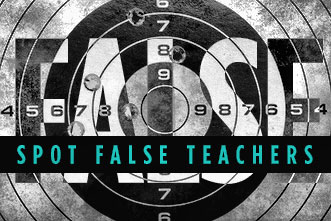“There were also false prophets among the people, just as there will be false teachers among you” (2 Peter 2:1).
There are no “ifs, ands or buts” in Peter’s words. It’s a clear and definite statement. There were false prophets among the people (of Israel in the Old Testament). That’s a matter of history.
False prophets were a constant problem in the Old Testament, and those who falsely claimed to be prophets of God were to be stoned. The people rarely had the will to deal with them, so they multiplied, causing disaster to the spiritual life of God’s people.
In the same way, Peter says, “There will be false teachers among you.” Notice the words “among you.” Peter is writing to the church and says, “There will be false prophets among you.” So he is not talking about New Age people on television. He is talking about people in the local church, members of a local congregation.
There is no such thing as a pure church this side of heaven. You will never find it. The wheat and the tares grow together. Warren Wiersbe writes:
Satan is the counterfeiter … He has a false gospel (Galatians 1:6-9).
Authentic or Counterfeit?
How would you recognize counterfeit Christianity?
In 2 Peter 1 we read about genuine believers. And in 2 Peter 2 we read about counterfeit believers. If you put these chapters side by side you will see the difference between authentic and counterfeit believers.
1. Different Source.
Where does the message come from?
Peter says, “We did not follow cleverly invented stories when we told you about the power and coming of our Lord Jesus Christ” (1:16). And then he says the false teachers exploit you “with stories they have made up” (2:3). So the true teacher sources what he says from the Bible. The false teacher relies on his own creativity. He makes up his own message.
2. Different Message.
What is the substance of the message?
For the true teacher, Jesus Christ is central. “We have everything we need for life and godliness in Him” (1:3). For the false teacher, Jesus is at the margins: “They will secretly introduce destructive heresies, even denying the sovereign Lord who bought them” (2:1).
Notice the word secretly. It’s rare for someone in church to openly deny Jesus. Movement away from the centrality of Christ is subtle. The false teacher will speak about how other people can help change your life, but if you listen carefully to what he is saying, you will see that Jesus Christ is not essential to his message.












